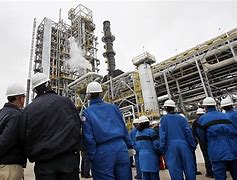The Nigerian National Petroleum Company Limited (NNPCL) has announced that the Port Harcourt Refinery has officially commenced operations, marking a significant milestone in Nigeria’s energy sector.
The announcement was made on Tuesday, November 26, by NNPCL’s Chief Corporate Communications Officer, Mr. Olufemi Soneye, in a statement to The Nation.
Soneye described the development as a “monumental achievement” for the country, signifying a move towards energy independence and economic growth.
“Today marks a monumental achievement for Nigeria as the Port Harcourt Refinery officially commences crude oil processing,” the statement read.
READ ALSO: NNPCL Declares State Of Emergency On Oil Production
He also extended congratulations to President Bola Ahmed Tinubu, the NNPCL Board, and the Group Chief Executive Officer, Mele Kyari, for their dedication to the success of the project.
“This groundbreaking milestone signifies a new era of energy independence and economic growth for our nation. Hearty congratulations to President Bola Ahmed Tinubu, the NNPC Board, and the exceptional leadership of GCEO Mele Kyari for their unwavering commitment to this transformative project. Together, we are reshaping Nigeria’s energy future!”
The operationalization of the Port Harcourt Refinery is expected to significantly reduce Nigeria’s dependence on imported refined petroleum products, potentially saving billions in foreign exchange and creating job opportunities across the value chain.
The refinery, located in Rivers State, has undergone extensive rehabilitation under the supervision of NNPCL.
READ ALSO: Brace For Further Fuel Scarcity, NNPCL Advice Nigerians
The move is part of broader efforts by the Tinubu administration to revitalize Nigeria’s refining capacity and strengthen the nation’s energy security.
Industry stakeholders have lauded the development, emphasizing its potential to boost the local economy and address recurring fuel shortages in the country.
The commencement of operations at the refinery is seen as a pivotal step in achieving the government’s agenda of increasing domestic refining capacity, ensuring affordable fuel for Nigerians, and promoting industrial growth.

